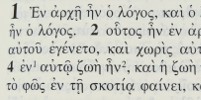As John nears the end of his revelation from Jesus Christ, he sees the new city of Jerusalem descending from heaven, and he hears Jesus say these words, “Blessed are those who wash their robes, so that they will have the right to the tree of life, and may enter the city by the gates” (Rev. 22:14 NASB 2020). In the original Greek, the word translated here as “wash” is a present participle, which implies an ongoing activity. This verse could be translated, “Blessed are those who are washing their robes.” Washing our robes is not something we do once and are done with it; it is something we must continually do day-by-day. No matter how mature we become in Christ, we will still have the need to wash our robes.
Earlier in his revelation, John tells us how we are to wash
our robes white. As part of his revelation, John sees a great multitude and is
told, “These are the ones who come out of the great tribulation, and they have
washed their robes and made them white in the blood of the Lamb” (Rev. 7:14
NASB 2020). We wash our robes through repentance and the forgiveness that are
found in the blood of Christ. The truth is, we will never outgrow our need for
the blood of Christ to forgive us and to cleanse us from our sins and the filth
we pick up from the world around us.
Furthermore, our experience with the forgiveness and
cleansing of the blood of Christ must also be manifested in the way we walk and
live. Speaking of the bride of Christ, which is the church of Christ, John is
told, “It was given to her to clothe herself in fine linen, bright and clean;
for the fine linen is the righteous acts of the saints” (Rev. 19:8
NASB 2020). The righteousness that is ours through the blood of Christ must
become manifested in our daily walk as we commit ourselves to good works towards
those around us. As we live righteous lives, as evidenced through our good
works, and as we continually avail ourselves to the blood of Christ, which forgives
and cleanses us, then we will be among those who are continually washing their
robes as we wait for Christ’s return.









